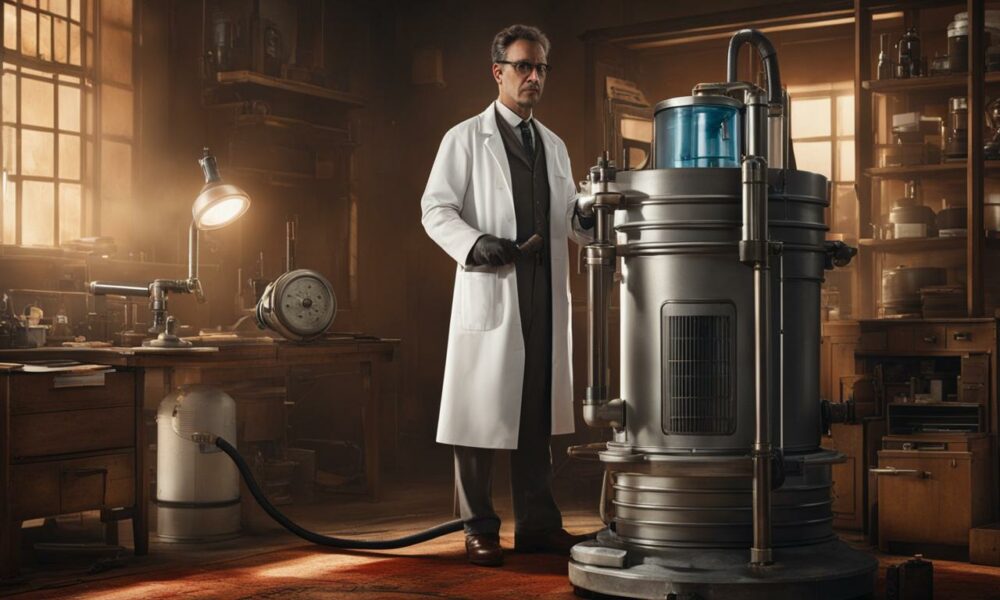
Unveiling History: When Vacuum Cleaner Invented and Its Impact
When it comes to household appliances, few have had as significant an impact as the vacuum cleaner. This indispensable device has made cleaning our homes faster and easier than ever before, but have you ever wondered how it came to be?
In this article, we will explore the fascinating history of the vacuum cleaner, from its early origins to the revolutionary inventions that shaped the modern vacuum cleaners we use today. We will also delve into how the vacuum cleaner has transformed domestic life, revolutionizing housekeeping practices and improving our quality of life.
Key Takeaways:
- The vacuum cleaner is an essential household appliance that has revolutionized the way we clean
- The early origins of the vacuum cleaner trace back to primitive versions, but it wasn’t until the 19th century that notable inventions began to emerge
- The vacuum cleaner has a rich history of innovation, with many pioneering minds contributing to its development over the years
- Advancements in vacuum cleaner technology have made cleaning faster and more efficient, with modern models offering a range of features and options
- The vacuum cleaner has had a profound impact on domestic life, simplifying the cleaning process and improving our overall quality of life
The Early Days: Origins of the Vacuum Cleaner
Before the vacuum cleaner as we know it today, people used a variety of methods to clean their floors. These included sweeping with brooms, beating carpets with handheld tools, and even using wet sawdust to trap dirt and debris. However, as technology advanced, so did the methods for cleaning.
The first vacuum cleaner patent was filed in 1869 by Ives W. McGaffey. His device was hand-cranked and featured a bellows that created suction to pick up dirt. However, it wasn’t until the early 1900s that vacuum cleaners became more practical and accessible for the general public.
The First Electric Vacuum Cleaner
In 1901, British inventor Hubert Cecil Booth patented the first electric vacuum cleaner. His device was massive and mounted on a horse-drawn carriage, making it impractical for home use. However, it paved the way for more streamlined and efficient electric vacuum cleaners in the future.
In 1905, American inventor Hiram Bingham designed a more practical electric vacuum cleaner that was suited for home use. His device used a motor to power a fan that created suction to pick up dirt, and it featured a dust collector bag to make cleaning easier. The “Vacuum Cleaner” was born.
The Vacuum Cleaner Timeline
Here is a timeline of notable events in the evolution of the vacuum cleaner:
| Year | Event |
|---|---|
| 1869 | Ives W. McGaffey patents first vacuum cleaner |
| 1901 | Hubert Cecil Booth patents first electric vacuum cleaner |
| 1905 | Hiram Bingham designs first practical electric vacuum cleaner for home use |
| 1926 | Hoover introduces “beater bar” to agitate carpet fibers and improve cleaning |
| 1936 | Filter system added to vacuum cleaners to improve air quality during use |
| 1953 | Electrolux introduces first canister vacuum cleaner |
| 1978 | James Dyson develops first “cyclonic” vacuum cleaner that does not use a dust collection bag |
As you can see, the vacuum cleaner has come a long way since its humble beginnings. Today, there are countless models on the market, each with their own unique features and capabilities.
Pioneering Minds: Who Invented the Vacuum Cleaner
Many inventors contributed to the creation of the vacuum cleaner. However, the first notable vacuum cleaner was invented by Hubert Cecil Booth in 1901. Booth, an English engineer, was inspired by a device he saw in a sawmill that blew the sawdust away using a jet of air.
“I felt that here was a way of removing dust and dirt from large buildings economically, without the disadvantages of the methods in use at the time.”
Booth’s vacuum cleaner was large and horse-drawn, but it revolutionized cleaning methods and sparked the development of smaller, more compact models. Another important inventor in the history of the vacuum cleaner was James Murray Spangler, who created the first portable electric vacuum cleaner in 1907.
Spangler was an American janitor who suffered from asthma. He created the vacuum cleaner to help him breathe easier while cleaning. He used a fan, a box, and a pillowcase to create a simple suction machine that removed dust and allergens from the air.
Spangler’s design was bought by William Hoover, who founded the Hoover Company and turned it into a household name. Hoover’s company produced the first commercially successful vacuum cleaner, which was based on Spangler’s design.
The vacuum cleaner has come a long way since its early days, thanks to the ingenuity of these and many other inventors who contributed to its development. The invention timeline of the vacuum cleaner shows a constant evolution that has given rise to modern versions that are more efficient and more user-friendly than ever before.
The Evolution: Advancements in Vacuum Cleaner Technology
The history of vacuum cleaners is a story of innovation and progression, with advancements in technology changing the way we clean our homes. From the first hand-pumped models to the sleek, powerful machines of today, the vacuum cleaner has come a long way.
The First Motor-Driven Vacuum Cleaners
The first motor-driven vacuum cleaner was invented by Hubert Cecil Booth in 1901. Booth’s machine used a motor to power a piston that created a partial vacuum, sucking up dust and dirt into a bag. This invention revolutionized the cleaning industry and started a new era of home cleaning.
“It was terribly hard work. But I knew that if I could find a way to suck the dust out of the carpets instead of beating it out, the dust would be gone forever.” – Hubert Cecil Booth
The Rise of Upright Vacuums
In the early 1920s, James Murray Spangler invented the first upright vacuum cleaner. Spangler’s design featured a motor-driven brush roll to agitate the carpet and dislodge more dirt and dust. This design paved the way for the modern upright vacuum cleaners that are widely used today.
Bagless Technology
In the 1980s, James Dyson developed the first bagless vacuum cleaner. Dyson’s design replaced the traditional bag with a transparent plastic container that could be emptied and reused. This technology eliminated the need for disposable bags, making vacuuming more environmentally friendly and cost-effective.
Smart and Cordless Vacuums
In recent years, vacuum cleaner technology has advanced even further with the introduction of smart and cordless vacuums. These vacuums are equipped with sensors and cameras to detect dirt and debris, and they can be controlled remotely with a smartphone app. Cordless vacuums also offer greater convenience and flexibility, allowing users to move from room to room without being tethered to a power outlet.
The evolution of vacuum cleaner technology has made household cleaning more efficient and effective than ever before. With constant innovation and development, it’s exciting to imagine what the future holds for this essential household appliance.
Impact on Domestic Life: How Vacuum Cleaners Transformed Housekeeping
When the vacuum cleaner was invented, it transformed housekeeping practices forever. With its ability to efficiently and effectively remove dust and dirt from floors and carpets, the vacuum cleaner quickly became an essential tool in every household.
Before the invention of the vacuum cleaner, cleaning floors and carpets was a laborious and time-consuming task. Dust and dirt had to be swept or beaten by hand, and carpets often had to be taken outside and hung up to be beaten and cleaned. This was a difficult and often unsanitary process.
The advent of the vacuum cleaner made it possible to clean floors and carpets in a fraction of the time, with much less effort. The modern vacuum cleaner is lightweight, easy to maneuver, and equipped with a range of attachments to clean even the most hard-to-reach areas. This has made it much easier for people to keep their homes clean and tidy, with less time and effort spent on housekeeping tasks.
The Benefits of Vacuum Cleaning
Vacuum cleaners have numerous benefits, including:
- Efficient cleaning: Vacuum cleaners are much more efficient than traditional cleaning methods. They can remove dust, dirt, and debris quickly and easily, leaving floors and carpets clean and hygienic.
- Improved air quality: Vacuum cleaners are designed to remove dust and other allergens from the air, improving indoor air quality and reducing the risk of respiratory problems.
- Reduced labor: Vacuum cleaning is a quick and easy way to clean floors and carpets, reducing the need for laborious and time-consuming methods.
- Increased lifespan of carpets and flooring: Regular vacuum cleaning can help extend the lifespan of carpets and flooring, keeping them looking newer for longer.
The Future of Vacuum Cleaning
The history of vacuum cleaner invention has been marked by constant innovation and improvement, and this trend is set to continue in the future. As new technologies emerge, it is likely that vacuum cleaners will become even more efficient, easier to use, and better for the environment.
One of the most exciting developments in vacuum cleaner technology is the emergence of robotic vacuum cleaners. These devices are designed to autonomously clean floors and carpets, using sensors to navigate and avoid obstacles. They offer a hands-free cleaning experience, and are perfect for busy households.
As the history of vacuum cleaner invention has shown, vacuum cleaners have had a profound impact on domestic life. They have simplified housekeeping tasks, improved indoor air quality, and made it easier for people to keep their homes clean and tidy. As vacuum cleaner technology continues to evolve, it is likely that we will see even more benefits emerge in the years to come.
Conclusion
In conclusion, the vacuum cleaner invention has an impressive history that has transformed domestic life forever. From its early origins to the groundbreaking advancements in technology that have aided modern-day cleaning practices, vacuum cleaners have come a long way.
Thanks to the ingenious minds behind the invention of the vacuum cleaner, we can now enjoy a seamlessly clean environment at home and in public spaces. The impact of the vacuum cleaner invention on society has been tremendous, and it is difficult to imagine modern life without it.
The vacuum cleaner invention has liberated us from manual cleaning, providing a more effective and efficient way to keep our homes clean and tidy. Its enduring legacy remains a testament to the ingenuity of the early inventors and their vision for creating a better, cleaner world.
FAQ
When was the vacuum cleaner invented?
The first mechanical vacuum cleaner was invented in 1869 by Ives W. McGaffey.
Who invented the vacuum cleaner?
The vacuum cleaner was invented by multiple inventors, including Ives W. McGaffey, Hubert Cecil Booth, and James Murray Spangler.
What were the early origins of the vacuum cleaner?
The early origins of the vacuum cleaner can be traced back to manually operated carpet sweepers, which were invented in the early 19th century.
How has vacuum cleaner technology evolved over time?
Vacuum cleaner technology has evolved significantly over the years, with advancements such as the introduction of electric motors, bagless systems, and robotic vacuum cleaners.
What impact have vacuum cleaners had on domestic life?
Vacuum cleaners have had a profound impact on domestic life, revolutionizing housekeeping practices by making cleaning more efficient and convenient.









